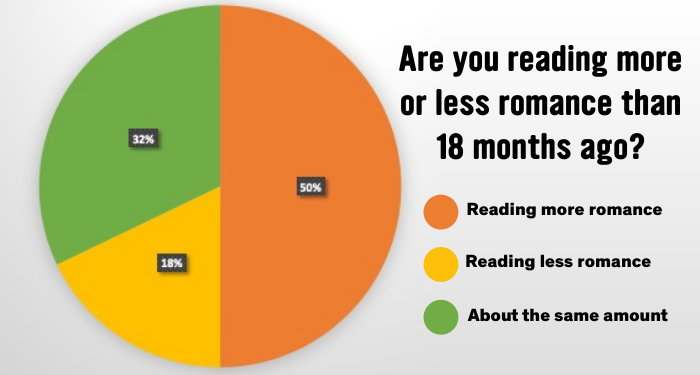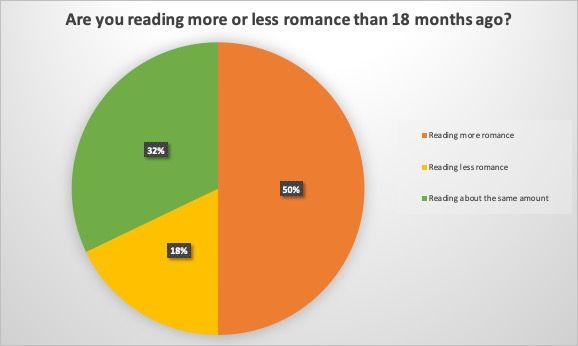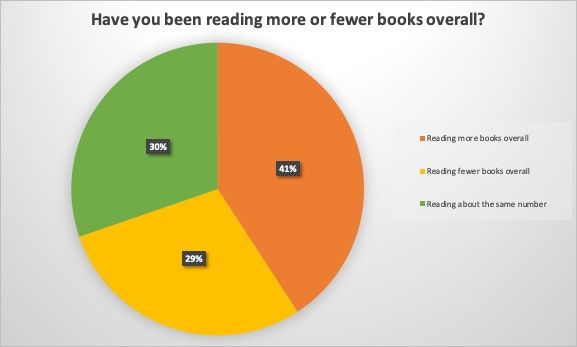
In with DNF-ing, Out With Real World Settings: Results From the WHEN IN ROMANCE Listener Survey
By now, it’s no secret that people are reading more romance than they were at the beginning of 2020. Book Riot’s own pandemic reading habits survey showed that 17.5 percent of respondents are reading more romance (a higher increase than any other genre), headlines proclaiming a romance “boom” pop up every few weeks, and the anecdotes from romance readers being asked for recs from friends, family, colleagues, and others who had long overlooked the unfairly discounted genre are piling up.
It makes sense. In a world that seems somehow mired in chaos, romance novels provide the assurance of a happy ending while also offering everything from the frothiest gentle love story to epic emotional stakes on the way to that HEA. Being a romance reader is like visiting an amusement park: you might choose the lazy river scenic boat ride or the triple black diamond roller coaster of terror, but either way, the safety bar is securely fastened. That kind of structure can be reassuring when the real world feels like not only have all of the safety bars disappeared, but even the lazy river has been overrun by sharknados.
So, people are reading more romance. For readers and advocates of the genre (like me), this is delightful! And for people who are prone to wondering and curiosity (also like me), this leads to more questions. And for people who host a romance podcast and have access to some people who might be willing to answer those questions (like my When In Romance co-host Jess Pryde and me), this offers a great reason for a survey.
Jess and I brainstormed a few questions, drafted the survey, and sent it out via a variety of channels (podcast show notes, social media, etc.), and we heard from about 220 readers. Since five of our seven questions were open response, we got a LOT of qualitative data. Much of it aligned with what we’ve all been hearing about reading in general in 2020 and 2021, but since we heard from readers — and mostly romance readers — in details and specifics about their experiences, we have the opportunity to dig a little deeper into what they’re saying. So I did.
Here are five takeaways from our survey:
Half of Romance Readers are Also Reading More Romance – Though They’re Also Reading More Overall
Our two multiple choice questions were focused on whether respondents are reading more or less romance and more or fewer books overall. The answer in both cases is, “more.”


As you can see, fully 50% of readers responding to the survey are reading more romance, but 41% are reading more overall. And since crunching a few numbers on the back end shows that 30% of respondents are reading more books AND more romance, it may be the case that — at least for many romance readers — the percentage of their reading that fits into the romance genre hasn’t changed a lot.
For Romance Readers, Ebooks Use is Up, and Audiobooks Use is Up…and Down
Our other questions allowed survey-takers to type whatever they wanted into the answer boxes, which made the results a little harder to fit into charts. But we can still put some numbers behind our question about preferred format: “Have you been reading in any new formats, or had trouble with formats you liked before?”
- 71 people indicated that their preferred format(s) hadn’t changed, and 137 reflected some kind of change in their consumption of audiobooks, ebooks, or physical/hard copy books.
- 48 of those responses indicated more frequent ebook use, and only 8 reflected less. That said, 3 of those 8 explicitly mentioned screen exhaustion or too much screen time during work hours impacting their ereading. It is a small sample? Definitely. Is it very relatable? Also yes.
- People reflected on a lot of reasons for increased ebook use, including the big one: they were easier to get than physical copies during the early days of the pandemic, either from ebook retailers or local libraries. And in what could be bad news for booksellers without an avenue for selling digital books, several folks mentioned that now that they’d switched to ereading, they weren’t likely to shift back.
- Among those who mentioned audiobooks, 41 (roughly 2/3) indicated they were reading more and 19 (roughly 1/3) indicated they were reading fewer. The larger and more general Book Riot survey showed a much bigger gap between those listening to more audiobooks (22% overall) and those listening to fewer (4% overall), so it’s interesting to observe that this subset of readers skew a bit differently.
Romance Readers Might be Picking Up More Books, But They’re Also Not Afraid to Put Them Down
Scattered prominantly throughout our survey responses was evidence that these readers are tired of sacrificing their reading time to any books they don’t really like:
- Dozens of respondents indicated that they find themselves more likely to “DNF” (did not finish) a book than they used to be — and they have zero regrets about it. As one newcomer to the joy of DNF-ing put it, “I ain’t in school anymore. No one can force me to finish a book I’m not into.” Responses indicate that some of these book breakups are related to slumps, but a lot of it also has to do with just being pickier. Speaking of which…
- Terms like “impatient” and “lack of patience” also came over and over again. Readers have left the land Giving the Benefit of the Doubt and taken the express train to Prove You Are Worthy of My Time. In short, “I am less patient with reading in general, and romance is the genre I read to feel good, so I’m not putting up with anything I dislike or even that bores me.” Reclaiming. Your. Time.
No Matter How Much People Are – Or Aren’t – Reading, It’s Been a Rough Year For a Lot of Us
Seeing how many respondents discussed the challenges they’ve faced in terms of mental health and wellness over the last year and the impact that struggle has had on their reading lives was undoubtedly the theme in our survey responses that hit me the hardest. The last year and a half has taken such a toll on so many of us, but for some readers, there might be some relief in knowing you’re not alone:
- Stress, depression, anxiety, and especially trouble concentrating all came up several times in the survey, and in particular related to our question, “Has anything surprised you about your reading and how it’s changed (or hasn’t) over the past year?”
- Some people shared explanations of how they felt stress and depression have been impacting their reading habits, and others seemed a mystified — and even a little disappointed in the way books, and romance in particular, had let them down: “The thing I used to escape the world no longer offered me escape for a bit and it was like a terrible breakup you didn’t see coming.”
- There haven’t been any easy answers for these kinds of problems, but survey responses suggested that at least some readers are turning to books — or more specifically, returning to them. Several readers — even some who hadn’t been rereaders previously — indicated that they’d been seeking calm and comfort in rereading old favorites. It won’t be a good solution for every reader, but for others it has helped. As one respondent put it, “I’m surprised by how much rereading I’m doing. I’ve struggled with mental health issues the last year and I normally don’t reread but I’ve reread so many of my favorites just to feel the happiness they bring.”
Kids, Germs, and Books That Are All Too Relatable
A few other things that didn’t come up enough to be trends, exactly, but came up frequently enough to be worth mentioning:
- Children can wreak havoc on your reading life. With kids stuck at home along with parents in many places, respondents saw impacts on how and how often they read. A few folks mentioned that they had less time for reading because of the kids, and others were just reading differently: jumping into a reading app on a phone or tablet for a few minutes can be easier than tracking down and picking up a hardcover book. And one survey participant noted that they’ve been listening to “significantly fewer audiobooks, I struggle to find time to listen when the kids are home ALL the time.”
- Living in a pandemic is top of mind in more ways than one. When we asked whether readers had “noticed any hard limits in reading romance that you didn’t have before,” the most frequent topic people indicated they were staying way more than six feet away from was pandemics, viruses, and illness. Concern over sickness impacted decisions beyond the page as well: multiple respondents indicated that their format of reading had changed in part because of germs.
- There is such a thing as a book being too relatable. The number of people reading less contemporary romance didn’t really surprise me, but some of the reasoning did. A few of the people surveyed indicated that it was hard, especially early in the pandemic, to read books that reminded them of what the world and relationships were like prior to the pandemic. In some cases it was tough not to still be able to exist in the world the way the characters were, but at least one reader was also uncomfortable reading about people — even fictional ones! — “getting close to each other and touching.” Regardless of the specifics, sometimes the fictional contemporary world was both too similar and too different from the 2020/2021 world for comfort. As one reader put it, “Sometimes I can cope with stuff set in a world that looks like mine did in 2019, and sometimes it just makes me feel desperately lonely and sad.”
But let’s end on some good news: most of our survey respondents indicated that they had found something good in reading romance over the last year: escapism, joy, representation that resonated with them, and more. And a handful of survey-takers were new to the genre and delighted to have found it. So although some (many) things may have changed (dramatically) over the last couple of years, for many of us, the romance genre is still providing the amusement park — and safety bars — we need to navigate the world.











